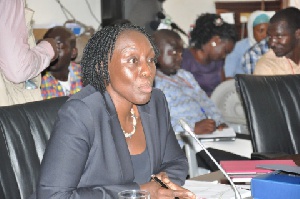The sole commissioner investigating colossal judgement debt and compensation payments to institutions and individuals, Justice Yaw Apau, has condemned the indifferent attitude of some public officials, whose inaction has been causing huge financial loss to the state.
Justice Apau, a Court of Appeal Judge sitting as the sole commissioner, bemoaned the worrying phenomenon in which those entrusted to defend and protect state resources, reneged on their duties and allowed institutions and individuals to have their ways in court through default judgements.
The sole commissioner registered his displeasure about the nagging issue yesterday when a recipient of judgement debt, James Manu, was subpoenaed to elucidate circumstances that led to him receiving about £10,463.17 and GH¢60,000 as judgement debt from the state.
Mr. Manu obtained default judgements in UK and in Ghana because those at the Attorney-General’s Department or the Ministry of Foreign Affairs, who were supposed to defend the state, either failed to appear in court or filed a shabby defence that was thrown out.
The sole commissioner could not fathom why the Attorney-General’s department, which is the nominal defendant in cases against the state as well as the Ministry of Foreign Affairs, was not properly represented in court to put their case across
The judgement in UK indicated that Mr. Manu should be paid a little over £28,400.00, less the £10,463.17 already paid.
Even though, the judgement could have been enforced in Ghana; Mr. Manu came to the country and filed for about £16,000, which was less than the difference of about £18,000.00 the UK court granted.
“Nobody is blaming you for taking that money, if it is legitimately yours. This commission is bothered about how the public officers who are supposed to handle matters of the state, go about their duties,” Justice Apau told Mr. Manu.
“You have gone to court to sue a whole Commission about a certain amount and Commission must appear in court to give their side of the story.
“In the UK, the Commission refused to appear in court and you got a default judgement, you came to Ghana and again the foreign mission refused to come and you took judgement, so you could have taken any judgement at all you would have wanted,” Justice Apau told Mr. Manu.
Giving the background to the case, Mr. Manu told the judgement debt commission that he worked as an employee of Ghana High Commission in UK for 25 years and after his retirement in 1999, he was paid an amount of £10,463.100 as his End-Of-Service Benefit (ESB).
He indicated the amount was far below what he was supposed to receive so he took the High Commission to court in UK and the court directed that he should be paid the difference with interest.
Presenting documents of the judgement in UK to the sole commissioner, Mr. Manu indicated the High Commission refused to pay the money so he came to Ghana and took the Ministry of Foreign Affairs to court to claim the amount due him.
Consequently, an Accra High court granted his reliefs and directed that the cedi equivalent of £16,000 be paid to him with interest, and this amounted to GH¢60,000.
Asked by Justice Apau whether he came to Ghana to enforce the judgement in UK, Mr. Manu indicated he could not explain even though evidence available showed that he started the case afresh in the country.
The sole commissioner said he asked the question because a “judgement from a foreign court can be executed in the country. When you obtain judgement in UK court and you want to enforce it in Ghana, you can do so.”
General News of Tuesday, 22 October 2013
Source: Daily Guide













